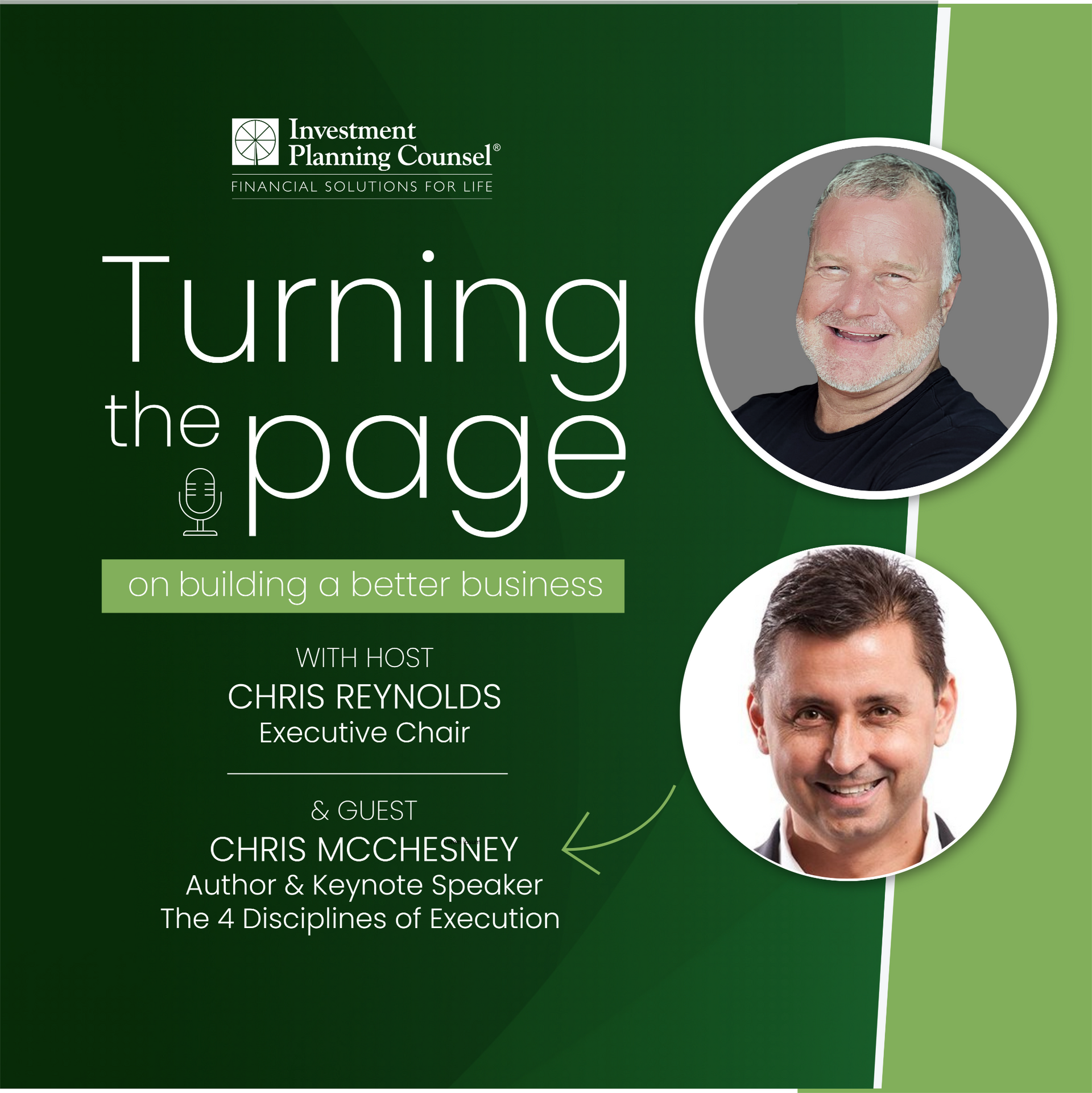The Four Disciplines of Execution with Chris McChesney
The most important part of strategy is execution. And, you can learn strategy in every business school, but, hardly anyone learns execution.
Execution often feels very particular to a situation, it doesn’t lend itself to best practices that can be shared from one environment to another. There is a distinction between practices and principles. It’s quite important to know the difference. Best practices are okay, but principles are gold.
Talking about execution in today’s podcast is Chris McChesney from 4DX. Chris got involved with Stephen Covey 30 years ago and for the last 20 of those years - with the team at Franklin Covey - he’s been working on finding solutions to the problem of execution. From that came the best-selling book, “The 4 Disciplines of Execution: Achieving Your Wildly Important Goals,” which was created to help entrepreneurs with their problem of execution. The book has literally changed Chris Reynolds’s life and his views on goal setting and tactics. One of his favorite quotes from the book is: “Strategy is easy – implementation is hard.”
Available on Spotify and Apple Podcasts
“In the moment, a human being will choose urgent over important. Which means you’ve got to have a system around this, and that’s where these commitments come in. … I’m going to make a commitment so that lead measures will happen.”
- Chris McChesney
Chris McChesney shares with us The 4 Disciplines of Execution and how embracing this mindset can help you achieve your goals not only in business but in life here: https://www.franklincovey.com/the-4-disciplines/
The Principle of Focus - Focus on the Wildly Important
Life and business throw many things at us that need to be done on a daily basis to keep the machine running. But it’s just as important to create a distinction between things in business and life that needs to be maintained from a single strategic priority.
How do you maintain that ‘focus’ and turn it into success?
By zeroing in on the ‘Wildly Important Goals’, or WIGS. Create a distinction in your brain between all the things that have to be maintained, and sustained and the single strategic priority that connects them.
Chris said “If you ask what is wildly important, my brain goes all the way to the top. It goes to the bottom line, growth, and these macro objectives. And that’s not what we’re talking about. If those macro objectives; like total sales or profitability - if those represent the title of a book, your wildly important goal is the chapter within the book, that’s going to make all the difference.”
As an example. Everyone wants profitability! But what is preventing that from happening? Maybe it’s smaller clients that eat up resources or spending enough time with bigger clients, a better experience. That’s where you have to get to. These goals have no value if they don’t hit the working level.
The Principle of Leverage - Act on the Lead Measures
Once you have what you need to accomplish identified, you can turn your focus to the lead measures. It’s similar to the Pareto principle, or 80/20 rule - act on the lead measures for that targeted, focused objective. It’s tough to move a rock, but it’s easy to pull a lever that can help to make that rock move.
It’s also important to understand the difference between lead and lag measures. Lag measures are what accountants are for - how much money you made. Lead measures are the harder part - what were the tactics that led to those results?
When you know this, you can turn your Wildly Important Goal into a winnable game.
Let’s say you want new accounts and clients. You know first appointments have a predictive ratio around new accounts, but you’re struggling. You know first appointments convert at around a 3:1 ratio. Sometimes, you have to go with a slightly smaller rock. Instead of choosing new accounts, what if you made the WIG first appointments? That’s a winnable game that matters. Do new first appointments matter? Yes! But it changes your thinking. But you can add a lever on that rock. Double down on referral leads for first appointments. That’s a winnable game and has a predictive outcome.
The Principle of Engagement - Keep a Compelling Scoreboard
Being able to see if you’re winning or losing at your winnable game can help you to stay on track. James Clear, the author of the best selling book “Atomic Habits” said “We don’t rise to the level of our goals. We fall to the level of our systems.”
Get off the emotional push you have for a goal and come back to systems. It comes down to the systems we have. Of the 12 million receptors going into our brain for input, 11 million of them are visual. We’re more visual than we realize. If you can’t see it, it’s gone. It’s competing with everything else going in your life. Can I see the lead measure? The outcome? In real-time?
The Principle of Accountability - Create a Cadence of Accountability
It comes down to force against leverage. We’re going to pull on that lever every week to make this winnable game happen. How? Keep a cadence of accountability. Know what actions to commit to every single week. What are the commitments I’m going to make in addition to all the stuff I have to do to get traction on that wildly important goal?
These disciplines are about bringing people in rather than pushing an agenda. It’s a great opportunity to build accountability with not only yourself but your team. Look at the scoreboard and ask “Based on your scoreboard what do you have to do this week…”
You’re committing to something that will ensure the lead measure. Let’s say your lead measure is to run six miles a week. You look at the forecast and see it’s going to rain a few days this week. What is your commitment to still make it happen? Will you go to the gym? Use the treadmill inside? This is the type of commitment that makes a Wildly Important Goal come to life.
It’s committing to an action that you can do that will have the biggest impact on keeping this a winnable game. The best leaders hold you accountable because they want the best from you.
What is YOUR wildly important goal?
Why not have a virtual coffee with Chris Reynolds and talk about it? Chris is a HUGE fan of the four disciplines and implements the strategies with his team and company every day. He’d love to chat with you more about it and how you can use it to accomplish big things in your business in 2023.
Set up a virtual coffee here: https://aspect.ipcc.ca/turning-the-page-podcast#grabcoffeewithchris
Be sure to
subscribe to Turning the Page on Apple, Spotify, or whatever podcast app you use! If you found the information helpful, be sure to share it with another financial advisor who could use these words of wisdom!





